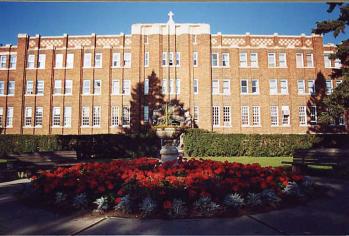
Independent schools have always existed in Saskatchewan, having been established at different times for different reasons. The first generation of independent schools are now referred to as the “historical high schools,” established in the early 1900s at a time when public high schools were not always available. These historical high schools include Luther College High School, the Mennonite school at Rosthern, and the Athol Murray College of Notre Dame in Wilcox. To accommodate their unique religious beliefs, the Seventh-day Adventists started their first school in 1924, and evangelical Christian schools began in the mid-1970s. In the 1970s, other alternative schools were established to provide an education for disabled or disadvantaged students.
Roman Catholic schools in Saskatchewan, as a result of the British North America Act (1867), are considered public schools and funded accordingly, but in many other provinces they are independent schools. While independent schools were in existence in Saskatchewan for a century, regulations, policies and procedures that clearly defined their legal status had not been developed. In 1986, the powers and responsibilities of provincial governments regarding the operation of independent schools were clarified when the Supreme Court of Canada rendered its decision in the Alberta case Jones v. the Queen.
The Saskatchewan provincial government announced in 1987 that Gordon Dirks would conduct a study on private schooling examining quality of education, funding, taxation, attendance requirements, and parent rights. In 1988 the government announced it would establish a comprehensive system for the regulation and registration of independent schools through the Department of Education. In 1989 the Minister of Education established an Advisory Board on Independent Schools, chaired by Alec Postnikoff. Chris Gerrard was appointed head of a newly formed Independent Schools Branch in the Department of Education. In 1989, amendments to the Education Act were passed, and legislation and policies provided for regulation and registration of Independent Schools in Saskatchewan. In 2004 there were forty-eight registered independent schools, with a student population of 4,388 located in every region of the province. Such schools fall into four broad categories: religiously based, alternative, private, and other programs.
The first category, religiously based schools, makes up approximately 80% of all independent schools. Schools named after according to religious affiliation are Seventh-day Adventist, Mennonite, and Muslim. Historical high schools were founded by Lutherans, Roman Catholics, and Mennonites. The Saskatchewan Association of Independent Church Schools represents various Evangelical Christian groups. Society schools are operated by a group of parents as opposed to a specific church. Associate schools refer to religiously based schools that enter into an operating agreement with a local public school division.
The second category of independent schools comprises the alternative schools, which offer special needs programs for disabled or disadvantaged students. Schools such as the Joe Doucette School in Saskatoon, which serves Aboriginal students, fall into this category. The third category consists of private schools. These include off-shore schools, which were created in 1995 when Saskatchewan Education indicated its intent to register non-profit, religiously based schools in other countries; in 2004 there were off-shore schools in Hong Kong and Venezuela. Another category of private school is referred to as for-profit school: private schools operating in Saskatchewan that cater to international students seeking Saskatchewan high school credentials fall into this category. Finally, the fourth category of independent schools concerns Montessori schools, which offer a unique student-centred program based upon the Montessori educational philosophy.
Saskatchewan's education system is a publicly funded system designed to meet the needs of the vast majority of students, with provision for parents to opt out for reasons of faith or educational belief. While historical high schools, associate schools, and alternate schools are eligible for provincial funding, private schools are not. Independent schools in Saskatchewan provide an education from a specific philosophical or religious perspective different from that of the public education system. Parents enrol their children in independent schools in order to achieve objectives that may not, or cannot, be satisfied within the public education system.
Eugene Hodgson